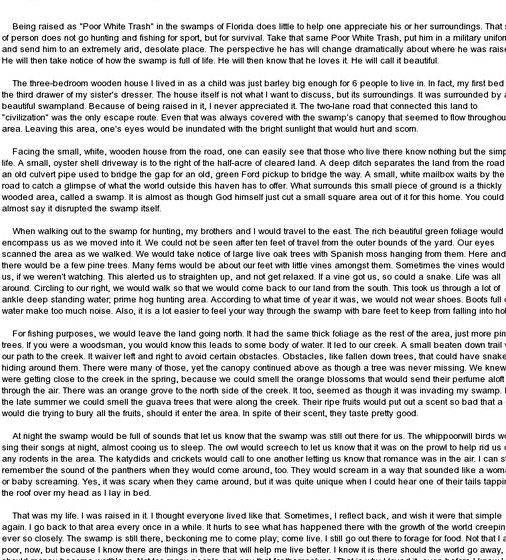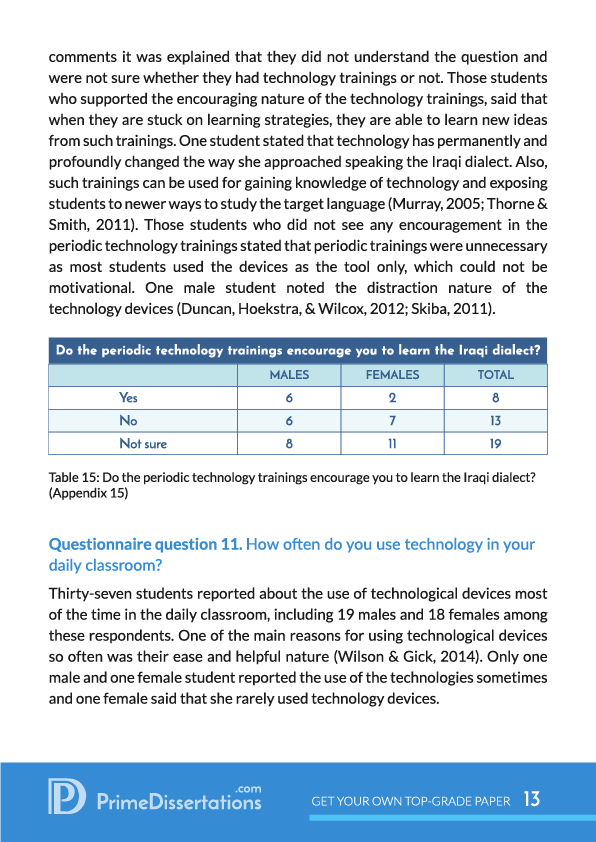
Tutors India provides high quality dissertation & thesis writing service & all kinds of academic help from writing and Journal article writing not only requires a high quality research but also should be able to present your findings and conclusion precisely with adherence to Personally, I appreciated the team's prompt follow-up, and we Ethically you have to make sure you have confidence in your findings and account for counter-evidence (evidence that contradicts your primary finding) and not report something that does not have sufficient evidence to back it up. Your findings should be related back to your conceptual framework Dec 13, · Unfortunately, some institutions have begun to “require” no less than 30 pages of literature review for a dissertation, which leads to students who write a textbook summarizing general information from the field of study, and advisors who overview this disastrous practice with righteous indignation if the student struggles to come up with
Dissertation Help Service Online
Learning Skills:. Writing Your Dissertation or Thesis eBook. Part of the Skills You Need Guide for Students. Subscribe to our FREE newsletter and start improving your life in just 5 minutes a day. The aim of the dissertation or thesis is to produce an original piece of research work on a clearly defined topic. Usually a dissertation is the most substantial piece of independent work in the undergraduate programme, while a thesis is usually associated with master's degrees, although these terms can be interchangeable and may vary between countries and universities, dissertation writing up findings.
A dissertation or thesis is likely to be the longest and most difficult piece of work a student has ever completed. It can, however, also be a very rewarding piece of work since, unlike essays and other assignments, the student is able to pick a topic of special interest and work on their own initiative. Writing a dissertation requires a range of planning and research skills that will be of great value in dissertation writing up findings future career and within organisations.
The dissertation topic and question should be sufficiently focused that you can collect all the necessary data within a relatively short time-frame, usually about six weeks for undergraduate programmes.
You should also choose a topic that you already know something about so that you already have a frame of reference for your literature search and some understanding and interest in the theory behind your topic. Most universities and colleges provide very specific guidance to their students about their preferred approach.
This page, and those that follow, are designed to give you some ideas about how you might carry out your literature reviewand then write each of the various sections of your dissertation in the absence of, or in addition to, any specific guidance from your university. However organised you are, writing your dissertation is likely to be one of the most challenging tasks you have ever undertaken.
Like an academic paper for journal publication, dissertations generally follow a fairly standard structure. The following pages discuss each of these in turn, and give more detailed advice about how to prepare and write each dissertation writing up findings. Particularly for master's programmes, your university may ask for your thesis to be submitted in separate sections, rather than as a single document.
One breakdown that is often seen is three-fold:. You will probably have an overall word count dissertation writing up findings the total dissertation or thesis. If you are required to submit in sections, ensure that you have left yourself enough words for the Results and Discussion.
It is easy to get carried away with the literature review. As a general guide, dissertation writing up findings, use the marking scheme to show you the approximate split for the word count. It is often easier to start with the literature review and then write the methodology.
One of the best ways to write a dissertation is as you go along, especially the literature review. As you read each reference, summarise it and group it by themes, dissertation writing up findings. You should be used to referencing by the time you write your dissertation but if you need a refresher then see our page: Academic Referencing.
Check with your university about their requirements before you start to write. Make sure that the voice and person are consistent throughout, dissertation writing up findings. Whatever style is preferred, aim to keep your language simple and jargon-free. Use shorter, simpler words and phrases wherever possible. Short sentences are good as they are easier to follow.
Any sentence that runs to more than three lines needs to be cut down or split. The role of your supervisor is to supervise your work. It is not to do it for you, nor to tell you how to do it. However, their academic reputation is bound up in the results of the students that they supervise so they have a vested interest in helping you to get the best possible marks. You should therefore dissertation writing up findings feel shy or embarrassed about asking them for help if you get dissertation writing up findings difficulties, or if you need some advice.
Academics tend to take a highly personal approach to supervision. Some will be prepared to spend a lot of time with you, talking about what you are planning to do by way of research and your emerging findings. Others will have very dissertation writing up findings contact with you, apart from being prepared to read a draft of your dissertation.
But do so as early as possible, dissertation writing up findings. If your university has a required format for a dissertation, and particularly if they supply a template, then use it!
Start your writing straight into the template, or format your work correctly from the start. There is very little worse than cutting and pasting your work frantically into a template 10 minutes before your submission deadline. Templates are designed to make your life easier, not harder. It is easier to do this as you go along. This will save you typing out all the names, and can also be used, with minor tweaks, for other formats.
If it looks odd, check the original source. This is likely to take longer than you think. If possible, try to find a friend or fellow-student in the same position with whom you can swap dissertations for proof-reading.
Fresh eyes are likely to spot errors much more effectively than those who already know what it should say. The international language of academic publishing is English and many universities require their students to publish their dissertations in English.
If your first language is not English, this is going to be a problem because your English will almost certainly not be up to the task.
You have two choices about how you approach this:. You will need to ensure that you build in sufficient time to allow someone else to read over your work. Nobody, not even if you are paying them, is going to want to stay up all night to edit your work because you left it too late, dissertation writing up findings. Many will also prefer not to work at weekends, dissertation writing up findings.
Allow at least two weeks for professional language editing. If you are found to have plagiarised you will be heavily penalised and will probably lose your degree. See our page: Academic Referencing for more information. This page sets out general advice on issues connected with writing a dissertation, also known as a thesis. The following pages set out in more detail how to approach each section of your dissertation, including the Literature ReviewMethodologyResults and Discussion.
The Skills You Need Guide for Students. Our eBooks are ideal for students at all stages of education, school, college and university. They are full of easy-to-follow practical information that will help you to learn more effectively and get better grades.
Continue to: Writing a Research Proposal Writing a Dissertation: The Introduction Writing the Methodology.
See also: Research Methods Dissertation Conclusions and Extra Sections Printing and Binding a Thesis: The Ultimate Dissertation writing up findings Guide. LEARNING SKILLS Writing a Dissertation or Thesis.
Search SkillsYouNeed:. Writing Your Dissertation or Thesis eBook Part of the Skills You Need Guide for Students. Subscribe You'll get our 5 free 'One Minute Life Skills' and our weekly newsletter, dissertation writing up findings. We'll never share your email address and you can unsubscribe at any time. Writing a Dissertation or Thesis See also: Writing a Research Proposal. There are many ways to write a dissertation or thesis.
Top Tip One of the best ways to write a dissertation is as you go along, especially the literature review. Remember the Golden Rule K. Ways to avoid being caught out inadvertently include: Never copy and paste from a journal article. Always summarise it in your own words, which also helps to make sure that you have understood it. If, for the sake of time, dissertation writing up findings, you want to copy and paste specific sentences which sum up the argument particularly well, always put them in quotation marks in your summary, with the source, so that you will remember that they are direct quotes and need to be acknowledged as such.
Further Reading from Skills You Need.
Dissertation Results Chapter: 7 Costly Mistakes To AVOID (Including Examples)
, time: 38:17Writing Chapter 2: Literature Review - Dissertation Advisors

Ethically you have to make sure you have confidence in your findings and account for counter-evidence (evidence that contradicts your primary finding) and not report something that does not have sufficient evidence to back it up. Your findings should be related back to your conceptual framework Dec 13, · Unfortunately, some institutions have begun to “require” no less than 30 pages of literature review for a dissertation, which leads to students who write a textbook summarizing general information from the field of study, and advisors who overview this disastrous practice with righteous indignation if the student struggles to come up with A thesis, or dissertation (abbreviated diss.), is a document submitted in support of candidature for an academic degree or professional qualification presenting the author's research and findings. In some contexts, the word "thesis" or a cognate is used for part of a bachelor's or master's course, while "dissertation" is normally applied to a doctorate.. This is the typical arrangement in
No comments:
Post a Comment